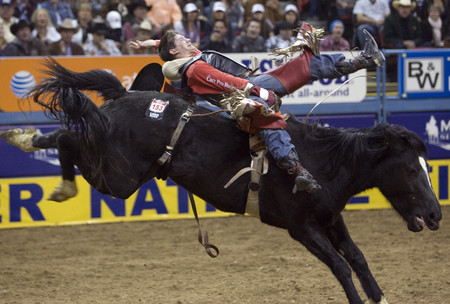G-forces guarantee rough ride
Rodeo isn't rocket science, but Justin Sportsmedicine is using NASA technology to make the sport safer.
It's no surprise that half of major rodeo injuries occur in bull riding, with riders being stomped, kicked and gored.
Bareback riding accounts for another 20 percent of injuries, and recent research indicates cowboys have blacked out from absorbing excessive G-forces when hitting the backs of their heads on their horses.
It happened to Justin McDaniel of Porum, Okla., on Sunday in the National Finals Rodeo at the Thomas & Mack Center.
"I don't remember anything after five seconds," he said, assuming he hit his head on the top of the horse's bony butt.
But McDaniel instinctively rode the final three seconds and remarkably won the go-round. He can't remember how many concussions he has had.
Don Andrews, executive director of the Sportsmedicine program he helped found in 1980, said his group of medical and training specialists realized a few years ago that some bareback riders found unconscious on the ground had blacked out without even making contact with the horse.
It's called vestibular concussion and is common in jet fighter pilots, Andrews said, adding, "It's a neurological issue (in the brain) that comes from excessive G-forces."
The theory was confirmed this year at RodeoHouston, where 20 bareback and bull riders wore accelerometers in their ears to measure Gs during competition.
Working with Andrews is Dr. Richard Jennings, a doctor with NASA in Houston, where he evaluates astronauts.
Jennings became involved when he realized the physical demands on bareback and bull riders are comparable to aerobatic pilots and astronauts he studies.
"In bareback, major injuries mostly involve the head and neck," Andrews said. "We are researching these injuries to determine if we can prevent them."
The research from Houston showed bareback riders pull up to 46 Gs, while bull riders registered as high as 26 Gs.
"The figure for bareback riders was what we had predicted but was still a bit of a shock," Andrews said, adding that the G-load in a 200 mph IndyCar crash can be 50 Gs and a boxing knockout punch can produce 58 Gs.
"It's like whiplash, but bareback riders' heads are moving constantly in a violent motion for at least eight seconds," he said.
Three of the 15 bareback riders were added to the Sportsmedicine injury report after Thursday's go-round with neck strains but will compete in tonight's penultimate ninth performance.
Bareback cowboys have used padded neck collars for several years. Andrews, recently named director of administration for the J. Pat Evans Research Foundation, said research is ongoing on how to enhance head and neck protection.
Winners of the eighth go-round, contested before a crowd of 17,306, were Bobby Mote (Cheney, Ore.) and Clint Cannon (Waller, Texas), tied in bareback; Stockton Graves (Newkirk, Okla.), steer wrestling; Travis Tryan (Billings, Mont.) and Michael Jones (Stephenville, Texas), team roping; Cody DeMoss (Heflin, La.), saddle bronc riding; Josh Peek (Pueblo, Colo.), calf roping; Brittany Pozzi (Victoria, Texas), barrel racing; and Kanin Asay (Powell, Wyo.), bull riding.
• NOTE -- Trevor Brazile can clinch his seventh all-around world championship in today's 6:45 p.m. go-round. Peek trails Brazile by $121,154. Brazile placed out of the money for the fifth time in calf roping and seventh time in team roping.
Contact reporter Jeff Wolf at jwolf@reviewjournal.com or 702-383-0247.
Day 8 slide show
NFR video






















